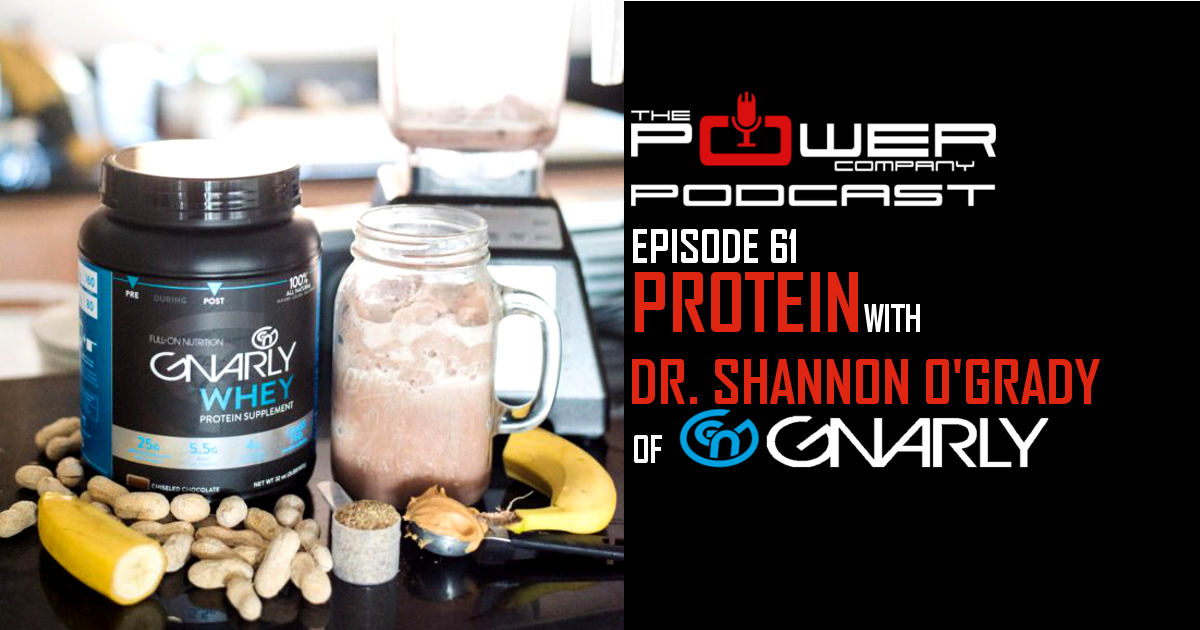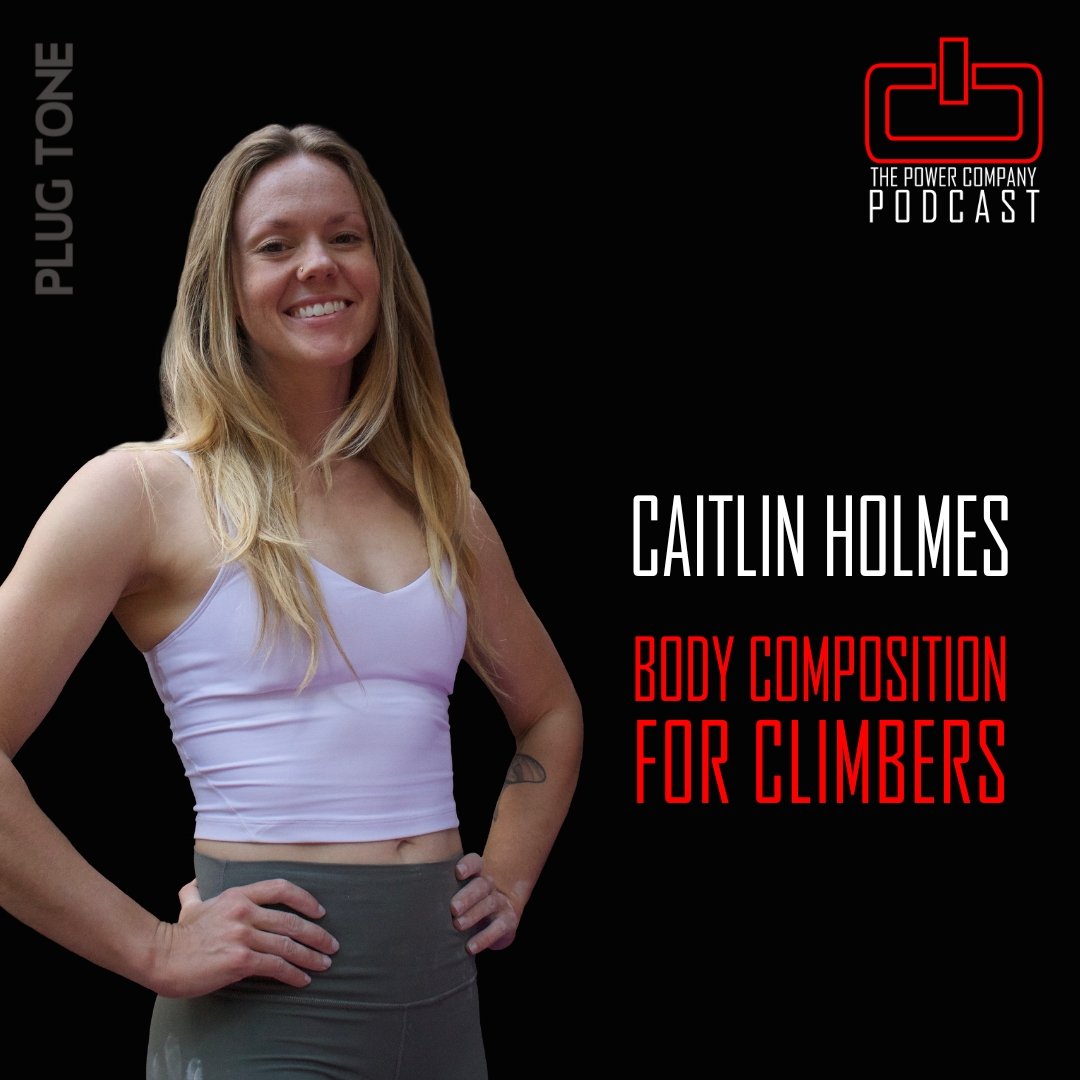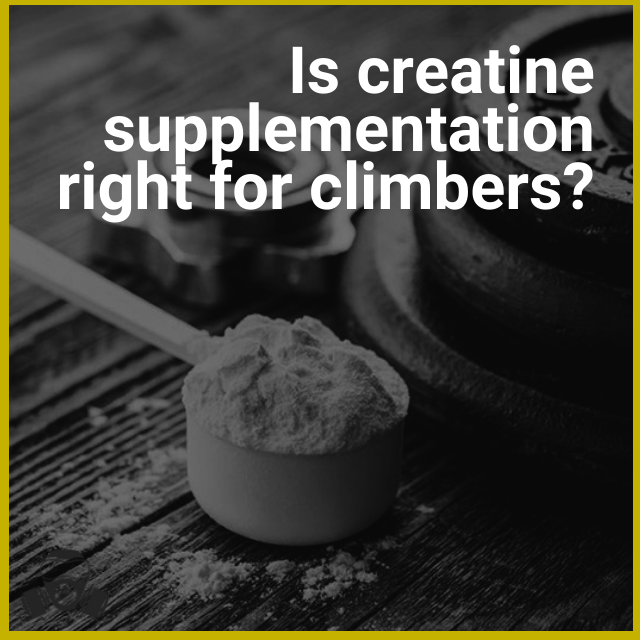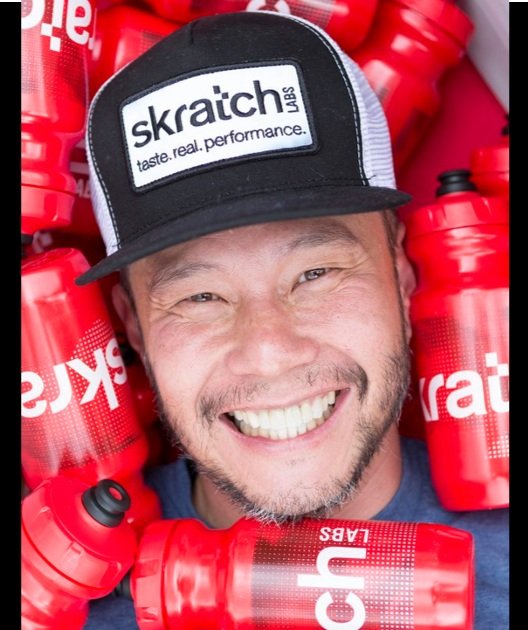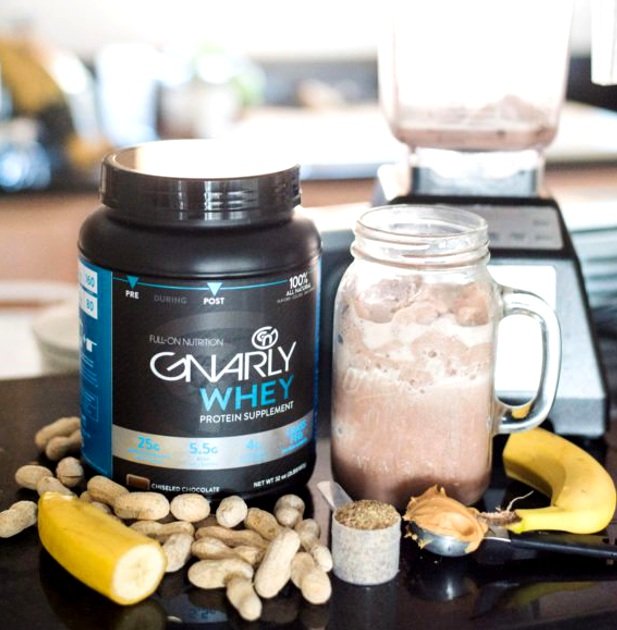Episode 61: Protein with Dr. Shannon O'Grady of Gnarly Nutrition
Part two! In this episode, Dr. Shannon O'Grady and I discuss the hot button topic of protein. Why do we need it, how much we need, and what's the best way to get it. Gnarly has both Vegan and Whey protein powders, and you can get 20% off by using the code POWERUP20 during checkout!
Like what you hear? Subscribe to The Power Company Podcast on ITunes, Google Play, or Stitcher Radio, and leave a rating and review!
FULL EPISODE TRANSCRIPT:
Kris Hampton 00:31
What's up everybody? I'm your host Kris Hampton. Welcome to Episode 61 of The Power Company Podcast brought to you by powercompanyclimbing.com. If you are here on this episode, you most likely listened to the previous episode, Episode 60 with Dr. Shannon O'Grady from Gnarly Nutrition, and we've got Shannon on again today to talk about all things protein. Protein is a pretty surprisingly to me, a pretty hotly debated topic. I do most everything by feel, less by science and if I feel like I need more protein, I eat more protein. If I don't feel like I need it, I don't eat it. That's just the way I operate. But some people take science as the absolute gospel and ignore feeling entirely, ignore anecdote entirely and, you know, that's their right. They can do that if they want to. I just don't operate that way. So I expect that I'll probably get all sorts of people posting scientific studies saying that all of this is wrong and, you know, that's okay. You can do that if you want to. I'm not going to read them, to be perfectly honest, because I just don't care that much. I spent, I spent about nine hours one day looking for studies that seemingly contradicted each other and it's, it's shockingly easy to find scientific studies whose abstracts contradict each other and, you know, so I'm just gonna go by what works for me. I mean, that's how science starts anyways. It almost always starts as anecdote and then they look for the reason why. So you know, I'm going to do it my way and this is my podcast, so I can. Okay, we are going to get into this episode, with Shannon O'Grady talking about all things protein. And thanks again to Gnarly for sitting down and educating me a little on BCAAs in our last episode, and protein in this episode. And, like I said before, Power Company has no affiliation with Gnarly other than they sent us their products. We like them. I wanted to talk to them about them. And, and that's where it ends. And while I was in, in Salt Lake City talking to Gnarly, I also had the chance to chat with Alex Honnold really quickly, and I got, I asked him about using Gnarly products. He's also not a Gnarly athlete, but he does love their vegan protein, which we talked about in this episode, so I just wanted to get his take on it.
Alex Honnold 03:21
Um, yeah, I'm, I'm Alex Honnold. I, I I hate to say use as a food, you know, I drink. I'm Alex Honnold, I consume the Gnarly Vegan Feast, well the vegan meal replacement, mostly the chocolate, but occasionally the vanilla. I do a lot of Gnarly, just like, I mean, it's like my favorite, easy drink, substitute meal thing. I don't even know what you call it, but it's just so delicious and it's like, perfect.
Dr. Shannon O'Grady 03:51
We like to characterize our company as more of a nutrition company snd I think if you can meet all of your nutritional needs with whole foods, then you should go for it.
Kris Hampton 04:18
So we're back for round two here. I'll tell you what, before we start talking about protein, why don't you give me just a brief background of who you are so that I can let people know what your qualifications are because they know I have zero qualifications when it comes to nutrition or protein or any of this.
Dr. Shannon O'Grady 04:39
Right. I don't know if you have zero qualifications, but I so I'm the Director of Product for Gnarly Nutrition. What does that mean? I lead up product development. I head up product quality, so I manage the manufacturing of our products, kind of how we ensure that our products are high quality and clean and pure. And I also work with our athletes and our team, to educate consumers and even do athlete education. Because amazingly, a lot of athletes don't know that much
Kris Hampton 05:19
Sure
Dr. Shannon O'Grady 05:19
About kind of how to use nutrition to kind of maximize performance and recovery.
Kris Hampton 05:23
Yeah,
Dr. Shannon O'Grady 05:24
I got into sports nutrition, with kind of a background in biology and nutritional physiology, that was kind of in a different context. I did some research in in water metabolism and in humans, but I always had a strong personal interest in performance. I'm a recovering endurance athlete.
Kris Hampton 05:46
Haha "recovering endurance athelete". That's a great way to put it.
Dr. Shannon O'Grady 05:50
So I think if you try to do anything that's, you know, on it, level of, of of time, that's over four hours, or even under that, I'd say over two hours, nutrition has to be a pretty integral part of your plan.
Kris Hampton 06:05
Yeah, the only thing I do for four hours is sleep
Dr. Shannon O'Grady 06:08
I don't know. Long climbing days, like with an approach and climbing all day and the way back, I would, I would count that as a form of endurance. But yeah, so I got really interested in it and with a science background, of course, I got super geeked out and nerdy, nerdy about it and learned a lot and, and then just decided that that was the direction I wanted to go. And I found Gnarly, and our value systems matched up with what what we believed in in terms of nutrition and quality.
Kris Hampton 06:39
Yeah that's important.
Dr. Shannon O'Grady 06:39
And yeah, it was a good fit.
Kris Hampton 06:41
Yeah, I think it's, I think it's important for the athletes, it's important for people to know that, you know, what I can see is that you're obviously excited about this stuff, and you care about it and you're, like you said, you geek out about it. And I mean, I think that's really important to have, instead of just, "Hey, here's a protein powder, let me grab that", you want to let people know, what's in it, why it works, how it works, all of that.
Dr. Shannon O'Grady 07:10
Yeah and the fun thing about nutrition too, and about science in general, you know, is one, nothing is set in stone.
Kris Hampton 07:17
Right.
Dr. Shannon O'Grady 07:18
I mean, certain things, global warming, climate change. Sadly, not enough people realize that those are set in stone, but in the field of nutrition, you know, constant research in new areas just kind of opens up new ideas about, you know, what we should be taking, when we should be taking it, how we should be taking it.
Dr. Shannon O'Grady 07:38
Right. And, and it's fun. And so it's a continuous learning process for me, both because sometimes it's hard to stay up on top of all of the most current research
Kris Hampton 07:48
No question.
Dr. Shannon O'Grady 07:48
Especially with everything else that that I do. But it's it's fun, and I love it. I love learning. And that's a good, good basis, I think.
Kris Hampton 07:57
Yeah. And things change so quickly. I mean, I was just kind of delving into this world of research papers and how often they're proven or disproven, or what all that means and it's it's pretty shocking how quickly science changes its mind on things or not necessarily changes its mind, but finds out new evidence
Dr. Shannon O'Grady 08:23
For sure.
Kris Hampton 08:23
And goes a different direction.
Dr. Shannon O'Grady 08:25
Yeah, I mean, there's this big movement now to not only I mean, it's a it's a huge process to get a research paper published,
Kris Hampton 08:34
Published, right.
Dr. Shannon O'Grady 08:34
In a peer reviewed, even top tier journal. But there's an even larger movement to at the same time, release all the data that went into that research, so that independent groups can perform either just same statistical analyses cited or, or different stats, just to make it more of a transparent process, because there have been, you know, some some studies that have been called back. But yeah, it's interesting. It's, you know, ever growing field for sure.
Kris Hampton 09:07
That's cool. That's, that's really good to know. So let's jump into protein. I mean, I think that's how, most likely, how most people enter the world of supplements, you know, at least in my experience, that's where most people take their first leap into using a powder of some sort or
Dr. Shannon O'Grady 09:28
It's the gateway drug.
Kris Hampton 09:29
Yeah, totally. So, and I think there's a lot of misconceptions, including my own, I'm sure, and I would just love to know the details behind it. So number one, there are a bunch of different kinds of protein that you can buy in powder form and mix into a drink. Can you tell me a little about those, what they are and what works better than the others?
Dr. Shannon O'Grady 09:55
Sure. I mean, I think generally, the you know, king of all proteins is considered dairy based protein.
Kris Hampton 10:04
So that's whey protein, right?
Dr. Shannon O'Grady 10:07
Well, casein is another kind of subsection of dairy protein.
Dr. Shannon O'Grady 10:13
And there's a little difference in between those, I'll get to in a minute. But so then you can find whey protein isolate, whey protein concentrate, and then although you don't see him as much anymore, there are hydrosolatates.
Kris Hampton 10:13
Gotcha.
Kris Hampton 10:26
Okay.
Dr. Shannon O'Grady 10:26
So whey protein isolate, and those are, the difference between protein isolate and protein concentrate, are really the percentage of protein. So the protein, you know, that that's taken from the dairy goes through a concentration process. Whey protein concentrate is typically, you know, in the range of 70 to 80% protein. So, meaning that of the powder, 80% of it is protein. Isolates are more concentrated, so more processed and more concentrated. They're about 90% protein.
Kris Hampton 11:00
Oh gotcha.
Dr. Shannon O'Grady 11:01
Because of that, so there's, you know, people love to argue about stuff and this would be one of those things that they argue about is which is better.
Kris Hampton 11:09
Right.
Dr. Shannon O'Grady 11:09
And so whey protein isolate has, has more protein per gram, has more, or excuse me, less fat, so for people really trying to control, you know, their macros, or they really want to minimize fat, you know, that is a benefit.
Kris Hampton 11:29
Right.
Dr. Shannon O'Grady 11:29
At the same time, it has, it has a little bit of lactose but negligible. So benefits of that are higher protein per gram, you know, and no lactose. Whey protein concentrate still has a lot of protein in it.
Kris Hampton 11:46
Sure.
Dr. Shannon O'Grady 11:47
I mean, 80% is only a 10% difference between those two. It has some lactose. It has a little bit of fat, like very little bit, like a gram or so in a complete.... in a complete like 20 gram of protein concentrate serving. And but what it does have, that, and this is where the argument comes in, is some of the bio factors that go along with the protein, people argue help with muscle protein synthesis. So you get those bio factors in the concentrate. You don't get them in the isolate.
Kris Hampton 12:21
You don't get them in the isolate, gotcha.
Dr. Shannon O'Grady 12:28
You know, and with the fats, it's it's a minimal amount of fat. There are fatty acids, but this becomes you know, another thing to consider when looking at you know, the sourcing. Are you sourcing your your protein from a grass-fed cow? Are you sourcing it from a conventionally raised cow? What's the quality of fat in one versus the other?
Kris Hampton 12:51
Gotcha.
Dr. Shannon O'Grady 12:52
Grass fed cows are higher in conjugated linoleic acid and other beneficial fatty acids. So that question is less of an issue with whey protein isolate, because once again, there's hardly any fat of it.... fat in it, but it becomes a little more relevant in whey protein concentrate. And then, and then hydrosolates are actually the protein broken down even further into basically chunks of amino acids, so it removes an element of the digestion. And so the argument is that it's better absorbed.
Dr. Shannon O'Grady 12:58
So it's easier....so you're not digesting it at all,it works similar to BCAAs?
Dr. Shannon O'Grady 13:33
I mean, you're still breaking up the peptides, but to a much...like less, smaller extent than you are with the BCAAs because the BCAAs are singular amino acids
Kris Hampton 13:47
So an easier digestion
Dr. Shannon O'Grady 13:47
Yeah, easier digestion. They tend to not taste so great.
Kris Hampton 13:53
Right. Which for some people might be totally fine.
Dr. Shannon O'Grady 13:55
For some people might be totally fine.
Kris Hampton 13:56
For me, it's not okay.
Dr. Shannon O'Grady 13:59
I'm on the same page.
Kris Hampton 14:00
Haha
Dr. Shannon O'Grady 14:00
Yeah. So um so in terms of like protein powders in the dairy category, those, those are your main ones. There's been a lot of kind of beef protein products coming up now and beef protein isolate. It's.... so the quality of a protein could can be measured in a number of different ways. The two kind of most important things to consider are how fast or how it's assimilated, so how much of it we actually take in and absorb and use. And then also, so we talked...when we talked about branched chain amino acids, we talked about the role that leucine plays in muscle protein synthesis
Kris Hampton 14:45
Right.
Dr. Shannon O'Grady 14:46
And so the quality of a protein can also be judged by the amount of of leucine in that protein. So once again, dairy reigns strong with our super high leucine content. It's really well digested. Beef protein isolate leucine content isn't as high.
Kris Hampton 15:06
Okay.
Dr. Shannon O'Grady 15:07
So I would argue that it's not as high quality of a protein.
Kris Hampton 15:11
Sure.
Dr. Shannon O'Grady 15:13
And then we, you know, we get to a lot of the vegan proteins. So it's a, it's a misconception I hear, I often hear a lot of people say, "Oh, they're not complete proteins", like you have to combine, you know, legume proteins with rice protein in order to get a complete amino acid profile. Now, while you don't maybe see as complete or as high of amino acids across the spectrum, in vegetable proteins versus in kind of dairy proteins, there are some super high quality. like pea protein is super high quality and it's not lacking. It's just not as high as dairy.
Kris Hampton 15:53
Right.
Dr. Shannon O'Grady 15:54
So, pea protein isolate, or legume, any legume protein is is also really high, high in leucine, has a good kind of complete amino acid profile. Where you benefit from mixing kind of grain and bean proteins is more like my job. It's a formulation aspect. So pea proteins are super dense. Rice proteins are super grainy. You mix them together and and you get a little bit better...I hate this word, but it's like the only word and we always joke about it in the office....you get a better mouthfeel, so it's like smoother.
Kris Hampton 16:29
Sure.
Dr. Shannon O'Grady 16:31
And that is the real kind of benefit from mixing those two proteins.
Kris Hampton 16:35
Okay, quick question on the vegan protein and just vegan protein in general. I know a lot of people believe that If you're vegan, it's going to be really, really difficult to get enough protein. Is there a benefit to using a vegan powder in that case? I don't know. Or can you get enough protein just eating vegan food?
Dr. Shannon O'Grady 17:01
You can get enough protein just eating vegan food.
Kris Hampton 17:03
Okay.
Dr. Shannon O'Grady 17:05
The things that I....over over protein intake, when I hear that somebody is vegan, the first thing I think of is, is iron intake and B 12 intake.
Kris Hampton 17:18
Gotcha. So protein isn't your main concern to begin with?
Dr. Shannon O'Grady 17:22
No no. I mean, I think it depends on the type of vegan we're talking about, like much like everything, there's a range.
Kris Hampton 17:29
Sure.
Dr. Shannon O'Grady 17:29
You know, I think if you're eating vegan, you have to make more of an effort to think about what you're taking in and the protein content, but you can get.....sorry we're playing footsie haha,
Kris Hampton 17:41
Haha didn't know if that was your foot or the table leg under there.
Dr. Shannon O'Grady 17:44
You can get enough protein through through legumes and even other sources of vegetable and meat substitutions and things like that. I mean, if you're, if you're just a salad eater, then then yeah, it's a concern.
Kris Hampton 17:59
Right.
Dr. Shannon O'Grady 17:59
But for someone that that actually thinks about it, there are plenty of options to get enough protein throughout the day.
Kris Hampton 18:05
Okay. And while we're talking about enough protein, what is that? What do you what do you recommend? What does the science say that we need daily?
Dr. Shannon O'Grady 18:15
Okay, so I mean, the RDA is super outdated. The recommended daily allowance for protein I think for individuals is like .8 grams per kilo, which is I would argue, probably not enough for a general you know, not someone that's training on a regular basis, but most people. But, because we live in America, most people probably overdo that anyways, I don't think it's a big concern. Athletes definitely need more protein. The general recommendation for endurance athletes is it's in like 1 gram per kilo to 1.6 grams per kilo. For strength athletes, it's higher than that. 1.6 to 2 or 2.2 grams per kilo
Kris Hampton 19:00
Okay.
Dr. Shannon O'Grady 19:02
There are some people that believe that kind of weight based measurements are a little bit outdated. I tend to think..... a lot of the studies are done with individuals in a particular weight range.
Kris Hampton 19:17
Sure.
Dr. Shannon O'Grady 19:18
And don't necessarily incorporate, and climbers don't fall into this category, but like bodybuilders that are you know, 180 to 280 pounds.
Kris Hampton 19:29
Right
Dr. Shannon O'Grady 19:30
A lot of the studies don't include individuals like that. And so,
Kris Hampton 19:34
Yeah, they're gonna be on an extreme, right? They are going to be needing and consuming a lot more protein than the average person or the normal athlete.
Dr. Shannon O'Grady 19:43
Completely. So so I do stick with the... I believe that the protein recommendations per weight are accurate. More recent studies that say in the last, you know, 5+ years, have come out, showing that and it's it's pretty interesting that a regular distribution of protein intake over day, as opposed to skewed protein intake. And when I when I say that, what I mean is like, say we're dealing with someone who who needs to take in like 100 grams of protein over the course of the day based on weight, and that's on the low end. That would be a pretty light person. So it's better to take that 100 grams and divide it up into fairly even doses throughout the day than it is to take more protein in the morning or more protein in the evening.
Kris Hampton 20:37
Right right.
Dr. Shannon O'Grady 20:37
And most people like, you know, with our cereal-based breakfast eating, I'd say most people are guilty of having a pretty low protein breakfast and eating most of their protein at night.
Kris Hampton 20:48
Right.
Dr. Shannon O'Grady 20:49
So. So a couple of things kind of surrounding that are that the dose of about 20 to 30 grams of protein in a sitting has been shown to maximally stimulate muscle protein synthesis.
Kris Hampton 21:04
Okay
Dr. Shannon O'Grady 21:05
So given that, and that is 20 grams of protein separated by I think it's like three to four hours between each 20 grams serving.
Kris Hampton 21:18
Okay.
Dr. Shannon O'Grady 21:18
So over the course of, you know, of 12 hours, you know, you're looking at four to five servings of 20 grams, if you're in the 80 to 100 grams. And and that, if you're doing that, then you're you're maximally stimulating muscle protein synthesis, and a lot of that is driven by by that leucine content. So in the two to three gram range of leucine is is where you see that muscle protein synthesis stimulated to the maximum amount.
Kris Hampton 21:49
Yep.
Dr. Shannon O'Grady 21:49
So that lines up also really well with the dosing we were talking about with branched chain amino acids yesterday.
Kris Hampton 21:55
Sure.
Dr. Shannon O'Grady 21:55
That five grams and the 2:1:1 ratio is 2.5 grams of leucine. So kind of the take home message is to evenly distribute your protein across the day
Kris Hampton 22:07
Spread it out.
Dr. Shannon O'Grady 22:08
You know, if you can get 20 to 30 grams, which sounds like a lot, but it's really not that much for you know, it's it's one serving of a protein shake. It's, you know, like four to six ounces of meat. I don't know what the equivalent like lentil serving would be, but you can get it from from kind of non meat, vegetables and legumes as well.
Kris Hampton 22:33
Okay. Spreading it out like that over, you know, several sittings, is there, is there an amount that we can assimilate at a time or in a day? Why is that better to spread it out instead of having it all at one time?
Dr. Shannon O'Grady 22:55
Yeah, so a couple of things on that. There is a limit to the amount we can assimilate. I think the research has shown that that number is in that 20 to 30 gram range.
Kris Hampton 23:07
In one sitting?
Dr. Shannon O'Grady 23:08
In one sitting. It's like...it takes like maybe like, I think it takes about an hour to digest 10 grams of protein.
Kris Hampton 23:20
Okay.
Dr. Shannon O'Grady 23:22
So you're looking for 20 grams, that's about two hours. So kind of gets to that spacing, why that spacing is key.
Kris Hampton 23:31
Yep.
Dr. Shannon O'Grady 23:31
And so if you're eating any more than that, you're, you're you're basically just, you know, it's passing through. You're not absorbing it.
Kris Hampton 23:39
Your body's just gonna get rid of it
Dr. Shannon O'Grady 23:40
No. There has been, there was a study. So most of the studies that have been done have shown, you know, either 20 or 30 grams, you get this increase, and then anything more than that it just plateaus in terms of muscle protein synthesis. So they tested up to like 90 grams, I think, compared to 30 grams, and you saw no increase in the 90 grams.
Kris Hampton 24:08
Gotcha. That's good to know, because I think that a lot of people just take this like, cursory look at it, and then go, "Oh, I just need more protein, more protein, more protein, more protein", you know, and end up with probably what's way too much if they're, you know, if they're using protein shakes or supplements.
Dr. Shannon O'Grady 24:28
Yeah, I mean, the way too much is also an interesting thing. You know, is there a danger to consuming too much protein? I haven't really seen unless you have like kidney dysfunction. I haven't seen evidence that suggests that there is. If you're stressing out about it, then yeah, you know,
Kris Hampton 24:49
Sure. So way too much isn't necessarily the right phrase. Maybe it's that they're just taking in more than they can handle or more than they need
Dr. Shannon O'Grady 24:58
Than their body needs, yeah.
Kris Hampton 25:00
Yeah, okay. Quick question. When I did a recent podcast with Neely Quinn, who I know you've talked with as well, we talked a little about protein and how much a person should get and interestingly, nutrition is one of these topics, as I'm sure you know, that there's some pushback on. People have strong opinions about nutrition and what they need.
Dr. Shannon O'Grady 25:27
Sure it's right up there with religion and vaccines
Kris Hampton 25:30
Politics,
Dr. Shannon O'Grady 25:30
Politics, things you shouldn't talk about at dinner.
Kris Hampton 25:32
Totally, totally. Which is interesting to me. I didn't realize that was the case. But in talking with Neely and when I put the podcast out, I got this feedback from people. And several people use the example of mother's milk as, like this should be the gold standard, and it only has this much protein, which is a much lower amount of protein. And, you know, their argument was, that's at a time when our bodies are growing the most and we only need this tiny bit of protein. Why should we need it when we're adults and we're athletes? What is your thought on that and have you heard this argument?
Dr. Shannon O'Grady 26:14
I haven't heard this argument and my brains going like, yeah, well, it's like cogs turning. Um, so my first reaction to that is, interestingly, given my whole spiel on the 20 to 30 grams thing, you actually need more protein as you age, as you get older. So older people benefit from more protein and that is the one case maybe where you see increases in muscle protein synthesis, above and beyond.
Kris Hampton 26:45
Is that because we have, you know, decreased muscle as we age?
Dr. Shannon O'Grady 26:52
Yeah, I'm guessing, you know. I don't know the answer to that question.
Kris Hampton 26:54
The body just slows down that synthesis, or...?
Dr. Shannon O'Grady 26:57
Yeah, that would that would be what I would guess
Kris Hampton 27:01
Sure.
Dr. Shannon O'Grady 27:01
I bring it up to illustrate the point, that at different times in our life, there are definitely different things going on, largely dictated by hormones. I would argue that your and I, like I, while I can't give you specific hormone levels, or any, I would argue that what we see in a baby, the amount of growth, where they get their energy. I mean, babies have brown fat, you know,
Kris Hampton 27:30
Right right.
Dr. Shannon O'Grady 27:31
That, you know, they they use and and is is a metabolic source in and of its own. Their, their physiological kind of
Dr. Shannon O'Grady 27:42
Makeup is vastly different.
Kris Hampton 27:42
Makeup
Kris Hampton 27:45
Yeah
Dr. Shannon O'Grady 27:45
Vastly different from that of an.... they sleep more, you look at their eating schedules.
Kris Hampton 27:52
Sure.
Dr. Shannon O'Grady 27:53
That way, you know, that milk is there only depending on you know, your strategy as a mother or father, that that milk is their only source of nutrition. So while I can't like, quote, the science, you know, I just don't think that's a valid comparison. And I apologize to people that do, but that's my, you know, just gut reaction.
Kris Hampton 28:15
Sure. You're totally allowed your opinion
Dr. Shannon O'Grady 28:17
Haha thanks
Kris Hampton 28:17
And, I mean, I have my thoughts as well, and they're similar to yours. But, you know, I think everyone's allowed their opinion, so I was just curious, your thought on, on what these people brought up to me.
Dr. Shannon O'Grady 28:32
Yeah, I mean, I, I'm totally a proponent of breastfeeding and I think it's super important. But yeah, yeah I think
Kris Hampton 28:40
We just have different needs when we're babies versus when we're aging athletes and recovering endurance athletes.
Dr. Shannon O'Grady 28:46
And if you look at, you know, generally the animal kingdom and when any kind of mother's milk is used for growth, it's only during a pretty limited period at the beginning of the animal's life and I think that's probably
Kris Hampton 29:04
There's a reason for that. Right.
Dr. Shannon O'Grady 29:06
Yeah.
Kris Hampton 29:06
Okay. Are there other types of protein that we didn't get to before I sidetracked you there?
Dr. Shannon O'Grady 29:11
I mean, there's a million different types of protein.
Kris Hampton 29:14
Common ones.
Dr. Shannon O'Grady 29:15
Common ones. Soy protein, also good protein that's gotten some bad....we don't use it in our products, but it's gotten a bad rap. I think just because people worry that it's a because it has phyto....soy naturally has phytoestrogens in it, which are compounds that mimic
Kris Hampton 29:33
Right. That's sort of the controversy I remember hearing about years ago.
Dr. Shannon O'Grady 29:37
Yeah. So so I think the general concern is that it's competing, or binding...it's either competing or binding to hormone binding sites in the body that estrogen, you know, would bind to, or in the case of males, that you know, maybe you wouldn't want.
Kris Hampton 29:55
Right, right
Dr. Shannon O'Grady 29:55
A substance like estrogen binding to you. The amount in soy products is pretty low and if you just look at the amount of even a vegan that eats a lot of tempe and tofu, like the amount that they would be getting, I just I don't really believe that it's a valid concern. We don't use soy, soy products in our, in Gnarly stuff and we tend to shy away from soy based ingredients, like we use sunflower lecithin in our products, as opposed to soy lecithin. And that's largely because of the allergenic qualities of soy.
Kris Hampton 30:36
Oh gotcha.
Dr. Shannon O'Grady 30:37
So kind of getting back to trying to make the line as accessible to as many people as we can. You know, we try to minimize, we test all of our products for gluten. We, you know, try to minimize the amount of soy, or minimize, we don't have any soy in our products and in our products that aren't dairy based, you know, we don't have any any animal products in those. They're all vegan.
Kris Hampton 31:00
Right. Right. So we talked a little about, you know, spreading it out throughout the day. What if you have some sort of athletic event, whether it's a workout or performance or whatever, is there a better way to time your protein when those things are happening?
Dr. Shannon O'Grady 31:17
Yeah, so we talked about this a little bit yesterday. I'm a big fan of taking branched chain amino acids before or during, both because you know, it plays a role in that preventing the muscle breakdown if you have those amino acid levels in your blood, but also because it's lighter on the stomach. But I'm also a huge proponent of following up with protein and in kind of that window following, the one to two hour window following
Kris Hampton 31:46
What if someone's not taking BCAAs at all, and they're just using protein sources?
Dr. Shannon O'Grady 31:52
Yeah. So I would start with, you know, if you, you're eating three meals a day and you you're, you're doing the 20 grams at each, 20 to 30 grams at each of those meals, then you can do another two to three snacks spaced throughout the day. And I would just be sure that the timing of that snack that's right before your training, or your workout, or whatever you're going to do, makes sense for what you're doing.
Kris Hampton 32:22
Yeah.
Dr. Shannon O'Grady 32:22
So you're not taking something super heavy if you are
Kris Hampton 32:25
Exactly.
Dr. Shannon O'Grady 32:26
Yeah.
Kris Hampton 32:26
Make sure it's something you feel good on instead of bogging you down.
Dr. Shannon O'Grady 32:30
Yeah and I think that timing is is is, is really important to work out ahead of time. Everybody's different. Some people you know, I've met ultra runners that can, you know, chow down a burrito while they're running, and they do fine and others that you know, like to like to run pretty light in terms of what they take in. So it's it's variable. It's very person dependent and it's something that should be worked out ahead of time. I'm a big believer in practicing your nutrition and if you have something that matters to you, a goal that you're striving for, you got to get that stuff figured out early.
Kris Hampton 33:06
Yeah, I found when I was performing quite a bit, music-wise, that if I ate right before I performed, I had a harder time with my breath control.
Dr. Shannon O'Grady 33:17
Interesting.
Kris Hampton 33:17
And that's carried over to sport climbing and bouldering now that I've, now that I've paid attention to it. I've noticed that if I eat something big, something heavy, I have have a harder time controlling how I breathe.
Dr. Shannon O'Grady 33:31
I wonder if it affects your diaphragm, having a full stomach?
Kris Hampton 33:34
Yeah. It could. I have no idea. I just know that it happens and you know, so I plan for that and I just don't eat anything heavy right before climbing.
Dr. Shannon O'Grady 33:44
Cool.
Kris Hampton 33:47
When you're taking protein for recovery after the workout, what do we need to think about to be able to make. it to maximize that recovery? I know we need carbs with it and I've heard the 3:1, 4:1, all sorts of ratios. Where does the science say we should be and what does experience tell you?
Dr. Shannon O'Grady 34:13
Sure. So we can kind of split those, you know, the three things. So I also am a big believer in in having a good source of fats. Because as athletes, and and you know, I would consider a lot of climbers that have a long approach, and then are climbing all day and then are hiking back home and have packs on, there's an endurance element to that.
Kris Hampton 34:41
Sure.
Dr. Shannon O'Grady 34:42
And a lot of endurance athletes store fats in their muscles. They are called intramuscular triglycerides. They they use fatty acids to create energy and adding fat in that recovery nutrition replenishes those things. So protein, carbohydrates and fat. So I just kind of said why you need some fat in there. The carbohydrates are there because they help with basically, glycogen loading. So so carbohydrates are stored as glycogen in the muscles and you're you're basically replenishing that. And the 3:1, 4:1, in terms of the insulin response, which helps your your muscles take in those carbohydrates and store them as glycogen is maximized. And that's kind of the the science that I've seen is in that, in that range. The protein, the 1, is, is for muscle protein synthesis. So those three things are the reason why you're combining those macronutrients.
Kris Hampton 35:49
Gotcha
Dr. Shannon O'Grady 35:49
There's some debate over the kind of what that window is that, you know, in terms of time
Kris Hampton 35:57
Post workout?
Dr. Shannon O'Grady 35:57
Yeah. I'd say I tend to just go with the "as soon as possible" is great.
Kris Hampton 36:04
Yep.
Dr. Shannon O'Grady 36:05
You know, that doesn't mean like, you have to be chugging a protein shake, like five minutes after you've done something hard. But like, if you can get it in in an hour, wonderful. If it's two hours, it's not the end of the world, you know, but I would try to get it in a two hour window. The sooner the better.
Kris Hampton 36:23
Yeah, I've found for myself that recovery is better generally, if I drink some protein source, with fats and carbohydrates, and I, I've always preferred just chocolate milk, a good chocolate milk. And part of that's just because I like chocolate milk.
36:44
It's delicious.
Kris Hampton 36:44
Yeah. And so that's what I've preferred. And I've, I can definitely tell a difference if I do that immediately after exercise or if I wait an hour, you know. And, and that's one of the things that I like about having a powdered protein of some sort, is that I can do it immediately after climbing because I don't need to keep chocolate milk cold in my car, which is difficult. But I can keep water in the car and I can keep the powder in the car and when I get back to the car after hiking out of the boulders or the crag or whatever, then I can do it right then. And that seems to work better for me than even if I skip that, eat dinner 45 minutes later. Having that chocolate milk immediately after or that protein immediately after seems to help me quite a bit.
Dr. Shannon O'Grady 37:38
Yeah, I've had the same experience and I think I generally hear that from most people too. I mean, there's the convenience of the powder, even if you're, you know, on a four day trip somewhere.
Kris Hampton 37:49
Yeah.
Dr. Shannon O'Grady 37:51
And you you're you're not carrying chocolate milk, you're not carrying a bunch of sources of protein, you know, that are whole foods. Just having the powder and being able to mix it is is really convenient and I think getting it in as soon as you can when your body's ready for it is is ideal.
Kris Hampton 38:09
Yep. And not all of us have Sprinter vans with refrigerators that we hike out to, so
Dr. Shannon O'Grady 38:14
This is true.
Kris Hampton 38:15
I think that's the that's the easy way to do it, is with these proteins or these protein powders. With the powder, when we're looking to get a good protein powder, what should we be looking for? Are there signs that we can see that say, this isn't the protein powder you want or this is?
Dr. Shannon O'Grady 38:42
Right. Yeah, so I think it gets back to kind of also what someone's goals are and if they have any dietary restrictions. So dairy based protein tends to be the best in terms of absorption and assimilation. In terms of high quality dairy protein, you know, we use grass-fed whey protein both because, you know, we use a concentrate, we believe you know that in kind of the lower processing that you see with concentrates, you get some bio factors that help with muscle protein synthesis. We also use New Zealand based grass fed protein because of the environmental impacts. It's GMO free, it's antibiotic free, you know, synthetic hormone free. So we believe in in those things. If you don't, I you know, I think whey protein in and of itself is a is a good
Kris Hampton 39:42
Good place to look
Dr. Shannon O'Grady 39:43
A good place to look. For vegan proteins, pea protein, I think is the top vegan protein that I can come up with off the top of my head and I would I would say soy protein is a pretty close, close second, but pea protein isolate is is has really high in the essential amino acids. It's really high in leucine as well. Not as high as dairy but but pretty darn high. It mixes really well. It has little to no aftertaste, so you know in terms of taste or enjoyability it's it's a good, it's a good vegan protein to look for.
Kris Hampton 40:27
Are peas themselves a really good source of protein?
Dr. Shannon O'Grady 40:30
Yeah, most legumes are pretty high in protein.
Kris Hampton 40:33
Okay. That's interesting. I'd never really thought about it. But I love peas and I never think about buying them, but now I should. Are there other things with protein that, again, like we did with the BCAAs, that I just am not knowledgeable enough to ask, are there things we should be thinking about?
Dr. Shannon O'Grady 40:54
I have podcast brain but
Kris Hampton 40:57
Hahaha
Dr. Shannon O'Grady 40:57
Haha I'll probably think about what I should have said, you know, in 10 minutes, but
Kris Hampton 41:02
Well, we've got years. We can do more of these.
Dr. Shannon O'Grady 41:06
Haha. Okay. So there's some studies showing I think there was a study that came out showing that including digestive enzymes, in particular proteases, which are digestive enzymes to help break down proteins, help with assimilation of the protein.
Kris Hampton 41:25
Okay. Where where do we find these digestive enzymes? Is that something you just
Dr. Shannon O'Grady 41:29
In Gnarly products haha. Yeah, so I mean, the the digestive enzyme blend in Gnarly contains a bunch of different enzymes.
Kris Hampton 41:36
So you should be looking for these in the powders that you buy.
Dr. Shannon O'Grady 41:39
Yeah, I mean, I it's not a necessity, but it helps. One, it helps...so in our enzyme blend, we, as I mentioned, we use a whey protein concentrate, whey protein concentrates have some lactose naturally. One of the enzymes in our enzyme blend is is a lactase. So any enzymes or proteins any....an easy way to kind of when you see a word to know it's an enzyme is that always ends in "ase". So protease. lactase, cellulase, those are all enzymes.
Kris Hampton 42:14
Gotcha
Dr. Shannon O'Grady 42:15
Proteases break down protein. Lactases break down lactose. So by including
Kris Hampton 42:21
That's a lot simpler than it sounds when I read it.
Dr. Shannon O'Grady 42:24
It's the same thing with sugars and "ose".
Kris Hampton 42:26
Oh, gotcha, yeah
Dr. Shannon O'Grady 42:27
Sucralose, glucose. So by including lactase, and proteases, you know, we've had people that have otherwise been unable to do whey protein concentrates, because if they're lactose intolerant
Kris Hampton 42:43
Right
Dr. Shannon O'Grady 42:44
Say that they they like our products for that reason, and that digestively, you know, it works for them. We also include probiotics and prebiotics for for that same reason. But, you know, our if a protein doesn't have those things, is it a bad protein? No. It's, you know, it's still good protein, but but once again, it you know, it's just a little edge that we have.
Kris Hampton 43:09
Sure, sure. I'm glad it's there. Okay, I think if that's , if that's all you need to say about protein, then I think I'm good. And we can just come back when you realize what you meant to say.
Dr. Shannon O'Grady 43:24
Haha maybe I'll come to Lander.
Kris Hampton 43:27
Yeah, that would be awesome. Okay, Shannon, thanks. I appreciate it.
Dr. Shannon O'Grady 43:30
Yeah, thank you.
Kris Hampton 43:33
Thanks again to Shannon and to all the folks over Gnarly for inviting me in and educating me a little on protein, which, like I said, is a hot button topic. It's a little shocking and a little bit sad, actually, that that's what we choose to argue about. But anyway, you know, you can choose whatever you want. For me, I know that I need protein. I can feel it when I need it and when I ingest it, it, it does me good. So I encourage you to experiment for yourself and see if you like using protein powders and whether you like the whey or the vegan or what works best for you. Give it a try. And you can get 20% off of any of the Gnarly products on their website at gognarly.com and use the code POWERUP20 when you're checking out and that'll get you 20% off and say thanks to them over there for that. I appreciate them working with me. They also gave our sponsors free sample packs and our highest tier sponsors get a free shaker bottle from Gnarly, so that's huge. I'm always trying to hustle for those guys because they support us. And you can find us as always at powercompanyclimbing.com You can support the podcast on Patreon at patreon.com/powercompanypodcast or you can go to our website, click the podcast tab. You can get there from there as well. You can find us on the Facebook. Please go join us over there. You can find us on Instagram. You can find us on Pinterest. You will not however ever, ever, ever ever find us on Twitter because we don't tweet. We scream like eagles.

